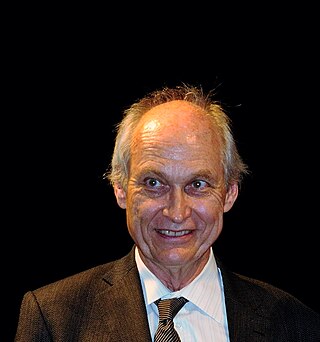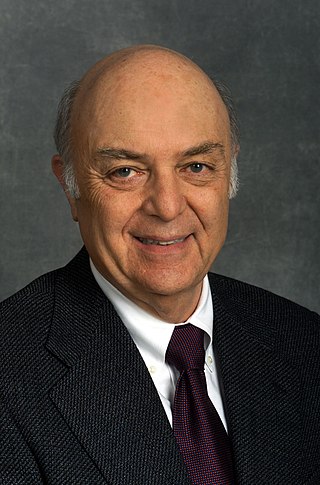External links
- "H. Eugene Stanley". Physics Department, Boston University.
- "Center for Polymer Studies, Boston University".
- "Website: H. Eugene Stanley".
- "Highly-cited articles by H. Eugene Stanley".
Harry Eugene Stanley (born March 28, 1941) is an American physicist and University Professor at Boston University. He has made seminal contributions to statistical physics and is one of the pioneers of interdisciplinary science. His current research focuses on understanding the anomalous behavior of liquid water, but he had made fundamental contributions to complex systems, such as quantifying correlations among the constituents of the Alzheimer brain, and quantifying fluctuations in noncoding and coding DNA sequences, interbeat intervals of the healthy and diseased heart. He is one of the founding fathers of econophysics.
Stanley obtained his B.A. in physics at Wesleyan University in 1962.
He performed biological physics research with Max Delbrück in 1963 and was awarded a Ph.D. in physics from Harvard University in 1967.
Stanley was a Miller Fellow at University of California, Berkeley with Charles Kittel, where he wrote an Oxford monograph Introduction to Phase Transitions and Critical Phenomena which won the Choice Award for Outstanding Academic Book of 1971.
Stanley was appointed Assistant Professor of Physics at MIT in 1969 and was promoted to Associate Professor in 1971. He was appointed Hermann von Helmholtz Associate Professor in 1973, in recognition of his interdepartmental teaching and research with the Harvard-MIT Program in Health Sciences and Technology. In 1976, Stanley joined Boston University as Professor of Physics, and Associate Professor of Physiology (in the School of Medicine). In 1978 and 1979, he was promoted to Professor of Physiology and University Professor, respectively. Since 2007 he holds joint appointments with the Chemistry and Biomedical Engineering Departments. In 2011, he was made William F. Warren Distinguished Professor. In the spring of 2013, he held the Lorentz Professorship at the University of Leiden.
Stanley had fundamental contributions to several topics in statistical physics, such as the theory of phase transitions, percolation, disordered systems, aggregation phenomena, polymers, econophysics and biological physics. His early work introduced the n-vector model of magnetism and its exact solution in the limit nà infinity, topics that are now part of standard statistical physics textbooks.
His seminal work on liquid water started with a percolation model he developed in 1980 with José Teixeira to explain the experimentally observed anticorrelations in entropy and volume. [4] In 1992 he developed the liquid-liquid critical point hypothesis, that offered a quantitative understanding of water’s anomalies, applying to all liquids with tetrahedral symmetry (such as silicon and silica). [5] Direct experimental proof for his proposal was obtained by recent experiments in Tsukuba, MIT, and Stanford.
Stanley introduced the term ‘econophysics’ in 1994 to describe the interdisciplinary field merging physics principles with economic phenomena. His research group has identified empirical laws governing economic fluctuations and developed statistical mechanics models to elucidate their underlying mechanisms.
The ISI Web of Science, lists 76,778 citations to Stanley's work (excluding 33 books). Using the Hirsch H Index metric for publication impact [PNAS 102, 16569 (2005)], Stanley has authored 129 papers with a citation count equal to or greater than 129, so H = 129. Google Scholar lists over 200,000 citations, with H = 201.
Stanley is committed to education at all levels, from high school to graduate studies. He has served as thesis advisor to 114 Ph.D. students and has collaborated with 211 postdoctoral fellows and visiting faculty. He is also active in worldwide efforts for achieving gender balance in the physical sciences.
Stanley has been elected to the U.S. National Academy of Sciences (2004), [6] the Brazilian Academy of Sciences. He is an Honorary Member of the Hungarian Physical Society. He is currently Honorary Professor at the Institute for Advanced Studies, University of Pavia (Pavia, Italy), and at Eötvös Loránd University (Budapest, Hungary). Stanley awarded the 2004 APS Nicholson Medal for Humanitarian Service, "For his extraordinary contributions to human rights, for his initiatives on behalf of female physicists, and for his caring and supportive relationship with those who have worked in his laboratory." [7]
For his contributions to phase transitions Stanley received the 2004 Boltzmann Medal, awarded by International Union of Pure and Applied Physics (IUPAP), and the American Physical Society 2008 Julius Edgar Lilienfeld Prize. [8]
He was awarded the Teresiana Medal in Complex Systems Research given by the University of Pavia. He also received the Distinguished Teaching Scholar Director's Award from the National Science Foundation, the Nicholson Medal for Human Outreach from the American Physical Society, a Guggenheim Fellowship (1979), [9] the David Turnbull Prize from the Materials Research Society (1998), [10] [11] a BP Venture Research Award, the Floyd K. Richtmyer Memorial Lectureship Award (1997), [12] the Memory Ride Award for Alzheimer Research, [13] and the Massachusetts Professor of the Year awarded by the Council for Advancement and Support of Education.
Stanley has received nine Doctorates Honoris Causa, from Bar-Ilan University Ramat Gan, (Israel), Eötvös Loránd University (Budapest). University of Liège (Belgium),[ citation needed ] University of Dortmund, University of Wroclaw, Northwestern University, University of Messina, University of Leicester, and the IMT Institute for Advanced Studies Lucca. [14]
Econophysics is a non-orthodox interdisciplinary research field, applying theories and methods originally developed by physicists in order to solve problems in economics, usually those including uncertainty or stochastic processes and nonlinear dynamics. Some of its application to the study of financial markets has also been termed statistical finance referring to its roots in statistical physics. Econophysics is closely related to social physics.

Michael S. Turner is an American theoretical cosmologist who coined the term dark energy in 1998. He is the Rauner Distinguished Service Professor Emeritus of Physics at the University of Chicago, having previously served as the Bruce V. & Diana M. Rauner Distinguished Service Professor, and as the assistant director for Mathematical and Physical Sciences for the US National Science Foundation.

Albert-László Barabási is a Romanian-born Hungarian-American physicist, renowned for his pioneering discoveries in network science and network medicine.
The Panofsky Prize in Experimental Particle Physics is an annual prize of the American Physical Society. It is given to recognize and encourage outstanding achievements in experimental particle physics, and is open to scientists of any nation. It was established in 1985 by friends of Wolfgang K. H. Panofsky and by the Division of Particles and Fields of the American Physical Society. Panofsky was a physics professor at Stanford University and the first director of the Stanford Linear Accelerator Center (SLAC). Several of the prize winners have subsequently won the Nobel Prize in Physics. As of 2021, the prize included a $10,000 award.
José Fernando F. Mendes is a Portuguese physicist and professor of physics, best known for his work and contributions to the field of network theory.Graduated from University of Porto in 1987. He earned a PhD in March 1995 from the same University under the direction of Eduardo Lage, the title of the thesis was "Dynamics of spins systems".

Marvin Lou Cohen is an American–Canadian theoretical physicist. He is a physics professor at the University of California, Berkeley. Cohen is a leading expert in the field of condensed matter physics. He is widely known for his seminal work on the electronic structure of solids.

Jesse Wakefield Beams was an American physicist at the University of Virginia. He was particularly known for his role in the development of the ultracentrifuge.
The Julius Edgar Lilienfeld Prize of the American Physical Society, to remember Julius Edgar Lilienfeld, has been awarded annually, since 1989.. The purpose of the Prize is to recognize outstanding contributions to physics.

Shlomo Havlin is a professor in the Department of Physics at Bar-Ilan University, Ramat-Gan, Israel. He served as President of the Israel Physical Society (1996–1999), Dean of Faculty of Exact Sciences (1999–2001), chairman, Department of Physics (1984–1988).
Srikanth Sastry is an Indian physicist. He is a Boston University alumnus and he along with Raghunathan Srianand were awarded the Shanti Swarup Bhatnagar Prize for Science and Technology in physical sciences in 2008.
Alexander Zakharovich Patashinski was a Soviet and Russian physicist. He is a professor for Materials Research Scientist and professor at Northwestern University in Evanston, Illinois.

Floyd Karker Richtmyer was a physicist and educator in the United States.
John Lawrence CardyFRS is a British–American theoretical physicist. He is best known for his work in theoretical condensed matter physics and statistical mechanics, and in particular for research on critical phenomena and two-dimensional conformal field theory.

Bikas Kanta Chakrabarti (born 14 December 1952 in Kolkata is an Indian physicist. At present he is INSA Scientist at the Saha Institute of Nuclear Physics & Visiting Professor at the Indian Statistical Institute, Kolkata, India.
János Kertész is a Hungarian physicist known for his contributions to the fields of econophysics, complex networks, and the application of fractal geometry in physical problems. He has played a pioneering role in these areas, expanding the understanding and applications of statistical physics and complex systems.
The Richtmyer Memorial Award is an award for physics education, named for physicist Floyd K. Richtmyer and given annually by the American Association of Physics Teachers. Its recipients include over 15 Nobel Prize winners.
Alexander Maurice Alers Hankey, known as Alex Hankey, is a theoretical physicist phd from Boston University, trained at Massachusetts Institute of Technology and Cambridge University. He was a post-doctoral fellow at Stanford Linear Accelerator Center. Deeply interested in Vedanta, Yoga, and Ayurveda, he played a vital role in setting up Maharishi University of Management and later on became a professor at it, where he taught the first undergraduate course in philosophy of science. His current work relates to applying a combination of philosophical arguments and knowledge of Vedic sciences to solve the problems within modern science, thereby refining the foundations of physics, biology, and information theory.
Robert Hamilton Austin is an American physicist and a professor of physics at Princeton University.

Peter James Reynolds is a theoretical physicist serving as a senior research scientist (ST) at the Army Research Office (ARO). He was formerly the ARO Physics Division chief and a program manager for atomic and molecular physics. Prior to joining ARO in 2003 he was at the Office of Naval Research, serving as a program officer, starting in 1988.
Morrel H. Cohen is an American theoretical physicist of condensed matter. He was a Professor of Physics at the University of Chicago from 1952 to 1981, having been appointed Louis Block Professor of Physics and Biology in 1972. He worked at the Exxon Research and Engineering Company from 1981 until 1996, and then served in an Emeritus role there until 2000. He currently has a post-retirement position at Rutgers and at the Chemistry and Chemical Biology Department of Princeton University. He has published over 280 peer reviewed documents and has over 24,000 citations, according to Scopus.